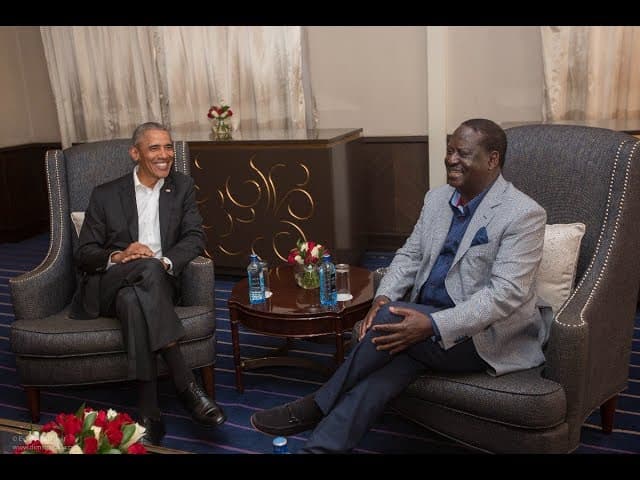We're loading the full news article for you. This includes the article content, images, author information, and related articles.
Former US President Barack Obama has paid tribute to the late Kenyan Prime Minister Raila Odinga, acknowledging his role as a champion of democracy and reconciliation, following public anticipation for his statement.

Former United States President Barack Obama on Friday, October 18, 2025, broke his silence on the passing of former Prime Minister Raila Odinga, issuing a heartfelt tribute that lauded Odinga's enduring commitment to democracy and national unity in Kenya. This statement followed days of public discourse among Kenyans, many of whom had questioned Obama's initial silence given his ancestral ties to Kenya and his past interactions with Odinga.
In his tribute, shared on Friday, October 18, 2025, Obama described Odinga as a "true champion of democracy" and a "symbol of resilience and reconciliation in African politics." He highlighted Odinga's journey as a "child of independence," who dedicated decades to the struggle for freedom and self-governance in Kenya.
Obama further remarked on Odinga's willingness to prioritise national interests over personal ambitions, stating, "Time and again, I personally saw him put the interests of his country ahead of his own ambitions. Like few other leaders anywhere, he was willing to choose the path of peaceful reconciliation without compromising his core values."
The former US President emphasised that Odinga's legacy extended beyond Kenya's borders, serving as an inspiration across Africa and globally. He concluded his message by extending his deepest condolences, alongside his wife Michelle, to Odinga's family and the people of Kenya.
Raila Amolo Odinga, who passed away on Wednesday, October 15, 2025, at the age of 80 in Kerala, India, due to a cardiac arrest, was a towering figure in Kenyan politics for decades. Born on January 7, 1945, he was the son of Kenya's first Vice President, Jaramogi Oginga Odinga, inheriting a profound legacy of political activism. Odinga's political career was marked by a relentless pursuit of democratic reforms, often at great personal cost.
He was imprisoned without trial for six years in the 1980s for his alleged involvement in a failed coup attempt against then-President Daniel arap Moi, a period during which he endured torture and physical abuse. Upon his release and return from exile in Norway in 1992, Odinga played a pivotal role in the reintroduction of multiparty democracy in Kenya.
Odinga contested the presidency five times between 1997 and 2022, each campaign leaving a significant mark on Kenya's democratic institutions. Notably, the disputed 2007 election led to widespread post-election violence, which was eventually resolved through a power-sharing agreement that saw Odinga serve as Prime Minister from 2008 to 2013.
During his tenure as Prime Minister, Odinga was instrumental in the promulgation of the 2010 Constitution, a landmark document that enshrined devolution, judicial independence, and strengthened human rights protections. This constitution also introduced the two-thirds gender rule, a policy Odinga vocally championed, advocating for increased women's participation in governance.
Obama's tribute joins those from numerous other global leaders and prominent figures. American civil rights activist Reverend Jesse Jackson Sr. had earlier mourned Odinga as a "dear friend and brother" and a "freedom fighter, statesman, and tireless champion for democracy and human rights." Kenyan Deputy President Kithure Kindiki confirmed during Odinga's state funeral on Thursday, October 17, 2025, that over 30 global leaders, including the UN Secretary-General Antonio Guterres and Indian Prime Minister Narendra Modi, had sent messages of sympathy.
Odinga's death leaves a significant leadership vacuum within Kenya's political opposition ahead of the 2027 general elections. His ability to unite diverse political factions and mobilise a strong base of supporters has been a defining feature of Kenyan politics. The question of succession within his Orange Democratic Movement (ODM) party remains unanswered, with no clear successor having emerged to date.
While widely praised for his democratic credentials, Odinga's political career was not without controversy. Critics often pointed to his alliances with former political adversaries, such as the 2018 'Handshake' with then-President Uhuru Kenyatta and a more recent working agreement with President William Ruto, as instances where his reformist ideals were perceived to have been compromised. These moves, while aimed at fostering national unity, sometimes divided his political base.
Raila Odinga passed away on Wednesday, October 15, 2025. A state funeral was held on Thursday, October 17, 2025, at Nairobi's Nyayo Stadium. President William Ruto declared seven days of national mourning following his death.
The immediate focus will be on the mourning period and the subsequent arrangements for Odinga's final rites. Politically, observers will be keen to see how the opposition navigates the post-Odinga era and whether a new leader or coalition will emerge to fill the void left by his passing. The future direction of the ODM party and its role in the lead-up to the 2027 elections will be a key area to watch.
Keep the conversation in one place—threads here stay linked to the story and in the forums.
Sign in to start a discussion
Start a conversation about this story and keep it linked here.
Other hot threads
E-sports and Gaming Community in Kenya
Active 9 months ago
The Role of Technology in Modern Agriculture (AgriTech)
Active 9 months ago
Popular Recreational Activities Across Counties
Active 9 months ago
Investing in Youth Sports Development Programs
Active 9 months ago
Key figures and persons of interest featured in this article